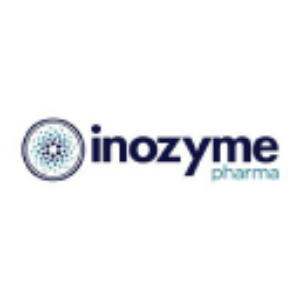Inozyme Pharma Announces Positive Interim Data for INZ-701 in Infants and Young Children with ENPP1 Deficiency and Key Program Updates
Rhea-AI Summary
Inozyme Pharma (NASDAQ: INZY) announced positive interim data for INZ-701 in treating ENPP1 Deficiency. The interim results from ENERGY 1 trial and Expanded Access Program showed significant improvements in infants and young children, including:
- 80% survival rate beyond first year (vs. 50% historical rate)
- Reduction or stabilization of arterial calcifications
- Improved heart function
- No evidence of rickets in patients evaluated beyond one year
- Favorable safety profile with only mild injection site reactions
The company completed enrollment in the ENERGY 3 pivotal trial with 25 patients, expecting topline data in early 2026. Additionally, Inozyme received regulatory support from FDA and EMA for the planned ASPIRE pivotal trial in children with ABCC6 Deficiency, targeting approximately 70 patients, with trial initiation planned for early 2026.
Positive
- 80% survival rate in treated infants vs 50% historical rate
- Successful reduction or stabilization of arterial calcifications in all surviving patients
- Completion of ENERGY 3 pivotal trial enrollment with >90% power to detect meaningful differences
- Preliminary regulatory support from FDA and EMA for ASPIRE trial
Negative
- High anti-drug antibody levels in some infants affected drug exposure
- Trial completion and data not expected until early 2026
- ASPIRE trial initiation dependent on financial resources availability
News Market Reaction
On the day this news was published, INZY declined 28.75%, reflecting a significant negative market reaction.
Data tracked by StockTitan Argus on the day of publication.
- Positive interim results in infants and young children with ENPP1 Deficiency showed improvements from baseline in multiple measures of disease, including survival, heart function, and stabilization or reduction in ectopic calcification and hypophosphatemia, with no radiographic evidence of rickets –
- Enrollment complete in ENERGY 3 pivotal trial in pediatric patients with ENPP1 Deficiency; on track to complete dosing in January 2026, with topline data to follow in early 2026 –
- Regulatory guidance from FDA and EMA supports planned ASPIRE pivotal trial focused on addressing severe complications of ABCC6 Deficiency in children –
BOSTON, Jan. 10, 2025 (GLOBE NEWSWIRE) -- Inozyme Pharma, Inc. (Nasdaq: INZY) (“the Company” or “Inozyme”), a clinical-stage biopharmaceutical company developing innovative therapeutics for rare diseases that affect bone health and blood vessel function, today announced positive interim data from its ENERGY 1 trial and Expanded Access Program (EAP) evaluating INZ-701 in infants and young children with ENPP1 Deficiency, completion of enrollment in the ENERGY 3 pivotal trial in pediatric patients with ENPP1 Deficiency and regulatory guidance for the ASPIRE pivotal trial in children with ABCC6 Deficiency.
“We believe these highly encouraging outcomes in infants and young children, combined with previously reported data from adult studies, provide strong support for the potential impact of INZ-701 on rickets, a key clinical endpoint in the ongoing pivotal ENERGY 3 trial, and underscore its potential to address the significant needs of pediatric patients,” said Douglas A. Treco, Ph.D., CEO and Chairman of Inozyme Pharma.
Matt Winton, Ph.D., Senior Vice President and COO of Inozyme Pharma added, “Our team and global collaborators worked tirelessly to identify and diagnose these rare patients and initiate treatment as quickly as possible. Tragically, in some cases, we have been unable to begin treatment before the infant passed. This only deepens our commitment to the patient community and strengthens our resolve to address unmet needs across all populations as we advance INZ-701.”
Positive Interim Data from the ENERGY 1 trial and Expanded Access Program
Interim data from the ENERGY 1 trial (three infants) and the EAP (two infants and one child -2.5 years old) evaluated patients with generalized arterial calcification of infancy (GACI), a severe manifestation of ENPP1 Deficiency. Patients were treated with INZ-701 for periods of three weeks to 22 months. The data presentation can be accessed here on Inozyme’s Investor Relations site. Key results include:
- Improved Survival:
80% of infants treated with INZ-701 survived beyond their first year, compared to a historical survival rate of approximately50% . - Reduction in Arterial Calcifications: Substantial reductions or stabilization of arterial calcifications were observed in all surviving patients, including complete resolution in some instances. There was no evidence of progression of arterial calcification in any patient.
- Improved Heart Function: Stabilization or improvement in left ventricular ejection fraction (LVEF) was noted in all surviving patients.
- Reduced Risk of Rickets: No radiographic evidence of rickets was observed in patients evaluated beyond one year of age and at-risk of rickets development (n=3), supported by stabilization or increases in serum phosphate levels.
- Favorable Safety Profile: INZ-701 was well-tolerated, with no serious treatment-related adverse events in infants and young children. Observed treatment-related events were limited to mild injection site reactions. Across studies to-date low, often transient, anti-drug antibody (ADA) levels were noted in some children and adults, with no impact on pharmacokinetics (PK) or pharmacodynamics (PD). In the ENERGY 1 trial and EAP, higher ADA levels in some infants significantly affected PK and PD. In infants with high ADA levels, data collected pre- and post-dosing demonstrated substantial transient increases in PPi and drug exposure following INZ-701 administration, consistent with the clinical effects observed. ADAs were not associated with adverse events in any patient.
Enrollment Complete in ENERGY 3 Pivotal Trial
The Company today announced completion of enrollment in its ENERGY 3 pivotal trial of INZ-701 in patients with ENPP1 Deficiency aged >1 to <13 years. Based on recommendations from the U.S. Food and Drug Administration (FDA), the primary endpoint of plasma PPi should be supported by consistent trends in appropriate clinical endpoints, such as radiographic global impression of change (RGI-C), a measure for progression or improvement of rickets. As per agreement with the European Medicines Agency (EMA), plasma PPi and RGI-C are co-primary endpoints, with a relaxed p-value of <0.2 for RGI-C.
With 25 patients enrolled, the trial’s 2:1 randomized design provides >
Regulatory Progress for ASPIRE Pivotal Trial in Children with ABCC6 Deficiency: Preliminary Support from U.S. and EU Regulators
Inozyme is advancing the development of INZ-701 in ABCC6 Deficiency. In April 2024, the Company reported topline data from an open-label, dose-escalation study in adults, along with findings from a natural history study documenting the significant disease burden in patients with the early-onset form of the disease, known as GACI Type 2 (GACI-2). The adult study demonstrated positive improvements in vascular and retinal pathology after 48 weeks of treatment with INZ-701, as well as normalization of PPi levels at the highest dose tested, supporting further development in additional age groups. The natural history study revealed a high disease burden characterized by childhood strokes, arteriopathy, cardiovascular complications, and early mortality. Further research has identified a substantial pediatric population with ABCC6 Deficiency, underscoring the significant unmet medical need in this group.
The natural history study data, supplemented by literature reports, has informed the design of the Company’s planned randomized, controlled ASPIRE trial of INZ-701 in children with ABCC6 Deficiency. The proposed primary endpoint, comprising major adverse clinical events over a two-year treatment period, has been reviewed and received preliminary support from U.S. and EU regulators. The trial is expected to enroll approximately 70 patients from infancy up to <18 years old with biallelic or monoallelic ABCC6 Deficiency. Inozyme is currently refining the study design to harmonize feedback from the FDA and EMA.
The Company plans to continue regulatory engagement over the coming months to finalize the trial protocol. Pending ongoing regulatory review and the availability of financial resources, Inozyme aims to initiate the ASPIRE trial in early 2026.
About ENPP1 Deficiency
ENPP1 Deficiency is a serious and progressive rare disease that affects blood vessels, soft tissues, and bones. Individuals who present in utero or in infancy are typically diagnosed with generalized arterial calcification of infancy (GACI Type 1), with about
About ABCC6 Deficiency
ABCC6 Deficiency is a progressive and debilitating rare disease that affects blood vessels and soft tissues. Infants with ABCC6 Deficiency are diagnosed with generalized arterial calcification of infancy (GACI Type 2), which is similar to GACI Type 1, the infant form of ENPP1 Deficiency. Pediatric patients who survive beyond the first year of life may develop neurological disease, including strokes, and cardiovascular diseases due to ongoing vascular calcification and stenosis. In older individuals, ABCC6 Deficiency manifests as pseudoxanthoma elasticum (PXE), characterized by abnormal mineralization in blood vessels and soft tissues, affecting the skin, visual function, and vascular system. Biallelic ABCC6 Deficiency is estimated to affect 1 in 25,000 to 1 in 50,000 individuals worldwide. Initially, it was believed to only impact individuals with two copies of the mutated gene. However, many people with just one copy of the mutated gene (monoallelic ABCC6 Deficiency) also exhibit severe symptoms. This suggests that the worldwide prevalence of ABCC6 Deficiency may be much higher than current estimates, which are based solely on biallelic cases. Currently, there are no approved therapies for ABCC6 Deficiency.
About Inozyme Pharma
Inozyme Pharma is a pioneering clinical-stage biopharmaceutical company dedicated to developing innovative therapeutics for rare diseases that affect bone health and blood vessel function. We are experts in the PPi-Adenosine Pathway, where the ENPP1 enzyme generates inorganic pyrophosphate (PPi), which regulates mineralization, and adenosine, which controls intimal proliferation (the overgrowth of smooth muscle cells inside blood vessels). Disruptions in this pathway impact the levels of these molecules, leading to severe musculoskeletal, cardiovascular, and neurological conditions, including ENPP1 Deficiency, ABCC6 Deficiency, calciphylaxis, and ossification of the posterior longitudinal ligament (OPLL).
Our lead candidate, INZ-701, is an ENPP1 Fc fusion protein enzyme replacement therapy (ERT) designed to increase PPi and adenosine, enabling the potential treatment of multiple diseases caused by deficiencies in these molecules. It is currently in clinical development for the treatment of ENPP1 Deficiency, ABCC6 Deficiency, and calciphylaxis. By targeting the PPi-Adenosine Pathway, INZ-701 aims to correct pathological mineralization and intimal proliferation, addressing the significant morbidity and mortality in these devastating diseases.
For more information, please visit https://www.inozyme.com/ or follow Inozyme on LinkedIn, X, and Facebook.
Cautionary Note Regarding Forward-Looking Statements
Statements in this press release about future expectations, plans, and prospects, as well as any other statements regarding matters that are not historical facts, may constitute "forward-looking statements" within the meaning of The Private Securities Litigation Reform Act of 1995. These statements include, but are not limited to, statements relating to the initiation, timing, and design of our planned clinical trials, enrollment and availability of data from clinical trials, the potential benefits of INZ-701 and our regulatory strategy. The words "anticipate," "believe," "continue," "could," "estimate," "expect," "intend," "may," "plan," "potential," "predict," "project," "should," "target," "will," "would," and similar expressions are intended to identify forward-looking statements, although not all forward-looking statements contain these identifying words. Any forward-looking statements are based on management's current expectations of future events and are subject to a number of risks and uncertainties that could cause actual results to differ materially and adversely from those set forth in, or implied by, such forward-looking statements. These risks and uncertainties include, but are not limited to, risks associated with the Company's ability to conduct its ongoing clinical trials of INZ-701 for ENPP1 Deficiency, ABCC6 Deficiency, and calciphylaxis; enroll patients in ongoing and planned trials; obtain and maintain necessary approvals from the FDA and other regulatory authorities; continue to advance its product candidates in preclinical studies and clinical trials; replicate in later clinical trials positive results found in preclinical studies and early-stage clinical trials of its product candidates; advance the development of its product candidates under the timelines it anticipates in planned and future clinical trials; obtain, maintain, and protect intellectual property rights related to its product candidates; manage expenses; comply with covenants under its outstanding loan agreement; and raise the substantial additional capital needed to achieve its business objectives. For a discussion of other risks and uncertainties, and other important factors, any of which could cause the Company's actual results to differ from those contained in the forward-looking statements, see the "Risk Factors" section in the Company's most recent Annual Report on Form 10-K filed with the Securities and Exchange Commission, as well as discussions of potential risks, uncertainties, and other important factors, in the Company's most recent filings with the Securities and Exchange Commission. In addition, the forward-looking statements included in this press release represent the Company's views as of the date hereof and should not be relied upon as representing the Company's views as of any date subsequent to the date hereof. The Company anticipates that subsequent events and developments will cause the Company's views to change. However, while the Company may elect to update these forward-looking statements at some point in the future, the Company specifically disclaims any obligation to do so.
Contacts
Investors:
Inozyme Pharma
Stefan Riley, Senior Director of IR and Corporate Communications
(617) 461-2442
stefan.riley@inozyme.com
Media:
Biongage Communications
Todd Cooper
(617) 840-1637
todd@biongage.com








